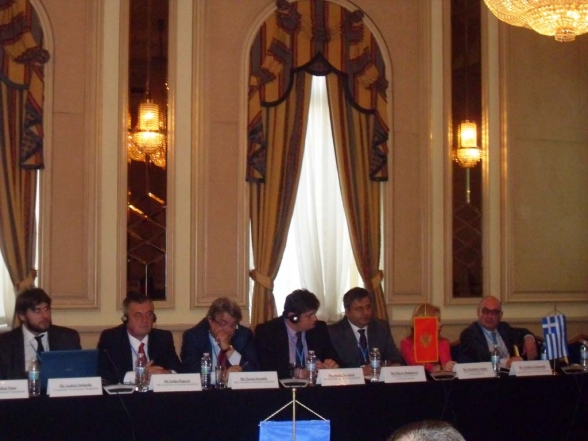At the seminar, which was organised by the European Parliament in Sofia, on the first working day, three sessions were held covering topics such as: instruments of parliamentary cooperation, development of necessary structures and mechanisms for development of inter-parliamentary communication with the pre-accession countries, as well as the importance of sharing experiences between countries in the negotiation process.
It has been pointed out that the EU accession negotiation process requires joint action of all institutions of the system, while the parliament, as a representative body has a special role in achieving transparency and democratic character of the process itself. Although there are various organisational, legal and political modes for legislative bodies to be included in the EU accession negotiations, openness and transparency of the process itself must hold a special significance for the position of the country. In that regard, on day one of the seminar, the importance of creating adequate models of inter-institutional cooperation was highlighted, which would contribute to better understanding of commitments arising from the accession negotiations, aimed at more effective fulfilling of requirements, which would ultimately lead to the country’s joining the family of European nations. The progress reports of the European Commission have also been mentioned at the seminar, in the context of commitments and recommendations that these documents define individually for each country. They should represent starting-point documents that the governments could use as guidelines for creation of their European policies, and the parliaments in oversight of implementation of measures required for achieving real progress.
On day two of the seminar, the discussion has covered challenges and the need for involvement of all segments of society in the pre-accession process, and the role of the national parliaments in harmonising legislation with the acquis. It has been emphasised that, in order to achieve oversight and legislative role of the parliament and reach a social consensus, the adequate institutional structure is necessary, as well as coordination of the work of the parliaments, cooperation with the parliaments in the region, and inclusion of civil sector in the process of strengthening the parliamentary institutions. Apart from the challenges encountered by the national parliaments in this process, focus is also placed on the key challenges identified in the European Commission Enlargement Strategy 2013-2014. In that regard, the new approach to the EU enlargement policy has been highlighted once more, where the rule of law is at the centre of the process, and the functioning of the institutions that guarantee democracy has also been in the focus of the discussion.
In the part of the seminar relating to comparative review of experiences and best practices both of member countries and candidate countries, the participants emphasised that the following were the main fields of parliamentary action in negotiation process of accession to the European Union: harmonisation of legislation (taking over European Union acquis), following and monitoring European integration process, inter-parliamentary cooperation and promotion of rights and obligations resulting from the accession process to the European Union. Speaking of meeting complex conditions of the corpus of EU law, the participants agreed that it was almost impossible to achieve alignment quality without strengthening the capacity of parliaments, its committees and expert staff. Thus, as concluded at the seminar, there is, undoubtedly, a need for coordinated action plan of governments and parliaments.
Members of delegation of the Parliament of Montenegro, as representatives of the country with most experience in negotiations compared to regional countries, presented recent activities of the Committee on European Integration and overall efforts of the Parliament aimed at contributing to quality of integration. They particularly emphasised amendments to the Rules of Procedure of the Parliament and recently adopted Resolution, as activities aimed at improving the system of inter-institutional cooperation in Montenegro, where the Parliament had an important role. Additionally, when it comes to negotiation process, they said that two chapters which were temporarily closed and another seven which have been opened indicate to satisfactory intensity of the negotiation process, in which Montenegro still had a lot of challenges. Recognizing the importance of increasing the level of public awareness of the integration process, and improving the transparency of negotiations, the activities of the Committee for European Integration aimed at closing the overall process to all citizens of Montenegro were presented at the meeting.
The Parliament of Montenegro was presented at the gathering by Chairperson and members of the Committee on European Integration: Mr Slaven Radunović, Mr Srđa Popović, Mr Zoran Srzentić and Mr Danko Šarančić. The seminar brought together representatives of the European Parliament, parliamentarians of the EU member states, candidate countries and potential candidates from the Western Balkans, as well as representatives of the regional initiatives.









